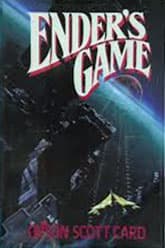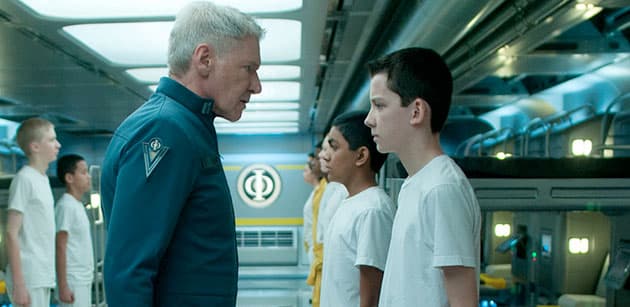Ender's Game
Critique • Quotes • At the movies
 First edition
First editionFirst publication
1985, United States
Literature form
Novel
Part of series
Ender's War (including Ender's Game and Speaker for the Dead) and the Ender series or Enderverse (1985–present)
Genre
Science fiction
Writing language
English
Author's country
United States
Length
Approx. 101,000 words

Colonel Graff (Harrison Ford) berates Ender (Asa Butterfield ) at Battle School in Ender's Game.
Worlds without end
Ender's Game (2013): Film, 114 minutes; director Henry King; writer Ivan Moffat; featuring Asa Butterfield, Harrison Ford, Hailee Steinfeld, Abigail Breslin, Viola Davis, Ben Kingsley, Aramis Knight
At least two major problems arise in trying to adapt the hugely popular books for the movies.
The novel Ender's Game is mostly about the training in space of child-age cadets, especially one Andrew "Ender" Wiggin, for war with aliens. This includes chapters of violent competition, bullying, even killing among the kids, not to mention conflict among the military instructors. Meanwhile back on Earth everyone is engaged in family and sibling rivalries, political struggles, and campaigns of economic domination. It's hard to imagine how all this action could be condensed into a two-hour movie without turning into an bewildering jumble.
The solution chosen by these filmmakers, as with many adaptation of complicated works, is to strip the story's central plot down to essentials and skip most of the subplots altogether. So we get mainly the rapid development of Wiggin from callow youngster to commander of Earth's forces before he even reaches puberty—which is still about as incomprehensible as that sounds.
If the adaptation were made later, the producers would have been better advised to present the story in its complexity over four-to-eight episodes for a streaming service. Then we could see the development of Ender—and those around him—step by step in credible fashion.
But the second problem is that the novel takes a couple of major U-turns near the end, revealing that the game Ender directs against video aliens at Battle School is more meaningful than any of the young cadets realized. Moreover, Ender is brought to a new, sympathetic understanding of the enemy. And anyone who had read the book or its sequels, or heard about them, would know these reveals were coming. They would be watching the training exercises and Ender's arduous climb to supremacy while knowing it was all a trick.
Apparently the novel's author, Orson Scott Card, had decided in an earlier screenplay to give away the book's secrets at the beginning of the film, but the Ender's Game script that was finally used plays it like the novel, as if the audience is unaware of the twists to come. And it still works to an extent. Thanks in large part to the accomplished acting of Asa Butterfield, who at age 15 had already starred in The Boy in the Striped Pyjamas and Hugo, among others.
An adult viewer may be annoyed by the very young Ender's too-quick advancement up the ranks. But Butterfield nails the nearly sociopathic Ender with his cold charm in his relations with fellow cadets and his cold strategizing in battle. And then he reverses to convincingly make the case for genuine remorse and empathetic connection with the defeated enemy at the end. It's a fine line to walk in blending both manifestations of the character.Action-packed trailer for the 2013 movie adaptation of Ender's Game
The other young actors don't get a chance to develop their characters to any great extent and the veteran stars brought in to play their military mentors are largely wasted. Harrison Ford huffs and puffs to show he's surly, cynical and ultimately wise as the general who oversees Ender's training, while Viola Davis is the inconsequential voice of reason as his sidekick major.
Ben Kingsley is barely there as Mazer Rackham, the supposedly dead hero of the previous war against the aliens—briefly showing up in bizarre makeup to give Ender the inside scoop on his famous battle.
The film cleans up some of Card's religious, political and homophobic views that some found in the novel. This is similar to how the film of Starship Troopers, based on another novel spouting militaristic views and also about cadets training to fight aliens called "bugs" (actually "buggers" in Ender's Game), diluted the objectionable elements and strove for a more sympathetic ending. Though, to be fair, for the Ender's Game adaptation, the turn came from Card's template in the novel.
It's just too bad the film was not a bigger financial success to spawn sequels that might have taken the story of Ender in more emotionally engaging directions.
— Eric

